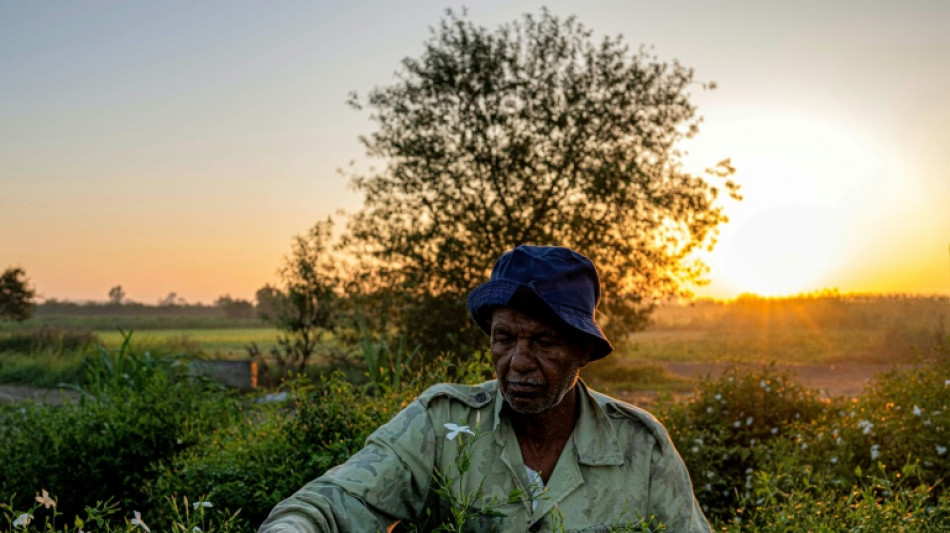
-
 Death toll tops 100 as Philippines digs out after typhoon
Death toll tops 100 as Philippines digs out after typhoon
-
Attack on key city in Sudan's Kordofan region kills 40: UN

-
 'No one could stop it': Sudanese describe mass rapes while fleeing El-Fasher
'No one could stop it': Sudanese describe mass rapes while fleeing El-Fasher
-
Champagne and cheers across New York as Mamdani soars to victory

-
 Medieval tower collapse adds to Italy's workplace toll
Medieval tower collapse adds to Italy's workplace toll
-
BMW boosts profitability despite China, tariff woes

-
 South Africa's Wiese wary of 'hurt' France before re-match
South Africa's Wiese wary of 'hurt' France before re-match
-
Asian markets sink as tech bubble fears grow

-
 Beyond limits: Croatian freediver's breathtaking record
Beyond limits: Croatian freediver's breathtaking record
-
Tottenham supporting Udogie after alleged gun threat in London

-
 Thunder roll Clippers to stay unbeaten as SGA keeps streak alive
Thunder roll Clippers to stay unbeaten as SGA keeps streak alive
-
In appeal, Australian mushroom murderer alleges 'miscarriage of justice'

-
 Toyota hikes profit forecasts 'despite US tariffs'
Toyota hikes profit forecasts 'despite US tariffs'
-
Typhoon death toll soars past 90 in the Philippines

-
 Ex-France lock Willemse challenges Meafou to become 'the bully'
Ex-France lock Willemse challenges Meafou to become 'the bully'
-
Ukrainians to honour sporting dead by building country they 'died for': minister

-
 At least 7 dead after UPS cargo plane crashes near Louisville airport
At least 7 dead after UPS cargo plane crashes near Louisville airport
-
US Supreme Court hears challenge to Trump tariff powers

-
 US government shutdown becomes longest in history
US government shutdown becomes longest in history
-
India's Modi readies bellwether poll in poorest state

-
 Green goals versus growth needs: India's climate scorecard
Green goals versus growth needs: India's climate scorecard
-
Where things stand on China-US trade after Trump and Xi talk

-
 Sri Lanka targets big fish in anti-corruption push
Sri Lanka targets big fish in anti-corruption push
-
NY elects leftist mayor on big election night for Democrats

-
 Injured Jordie Barrett to miss rest of All Blacks tour
Injured Jordie Barrett to miss rest of All Blacks tour
-
Asian markets tumble as tech bubble fears grow

-
 Pay to protect: Brazil pitches new forest fund at COP30
Pay to protect: Brazil pitches new forest fund at COP30
-
Australia pick 'impressive' Weatherald in first Ashes Test squad

-
 Iraq's social media mercenaries dying for Russia
Iraq's social media mercenaries dying for Russia
-
Young leftist Trump foe elected New York mayor

-
 Concerns at ILO over expected appointment of close Trump advisor
Concerns at ILO over expected appointment of close Trump advisor
-
Venus Williams to return to Auckland Classic at the age of 45

-
 No deal yet on EU climate targets as COP30 looms
No deal yet on EU climate targets as COP30 looms
-
Typhoon death toll climbs to 66 in the Philippines

-
 NATO tests war preparedness on eastern flank facing Russia
NATO tests war preparedness on eastern flank facing Russia
-
Uncapped opener Weatherald in Australia squad for first Ashes Test

-
 Liverpool down Real Madrid in Champions League, Bayern edge PSG
Liverpool down Real Madrid in Champions League, Bayern edge PSG
-
Van Dijk tells Liverpool to keep calm and follow Arsenal's lead

-
 PSG left to sweat on injuries to Dembele and Hakimi
PSG left to sweat on injuries to Dembele and Hakimi
-
Reddit, Kick to be included in Australia's social media ban

-
 Ex-Zimbabwe cricket captain Williams treated for 'drug addiction'
Ex-Zimbabwe cricket captain Williams treated for 'drug addiction'
-
Padres ace Darvish to miss 2026 MLB season after surgery

-
 Diaz hero and villain as Bayern beat PSG in Champions League showdown
Diaz hero and villain as Bayern beat PSG in Champions League showdown
-
Liverpool master Real Madrid on Alexander-Arnold's return

-
 Van de Ven back in favour as stunning strike fuels Spurs rout
Van de Ven back in favour as stunning strike fuels Spurs rout
-
Juve held by Sporting Lisbon in stalling Champions League campaign

-
 New lawsuit alleges Spotify allows streaming fraud
New lawsuit alleges Spotify allows streaming fraud
-
Stocks mostly drop as tech rally fades

-
 LIV Golf switching to 72-hole format in 2026: official
LIV Golf switching to 72-hole format in 2026: official
-
'At home' Djokovic makes winning return in Athens


Egyptian farmers behind world's perfumes face climate fight alone
For years, Egyptian jasmine picker Wael al-Sayed has collected blossoms by night in the Nile Delta, supplying top global perfume houses. But in recent summers, his basket has felt lighter and the once-rich fragrance is fading.
"It's the heat," said Sayed, 45, who has spent nearly a decade working the fields in Shubra Balula, a quiet village about 100 kilometres (60 miles) north of Cairo and a key hub for Egypt's jasmine industry.
As temperatures rise, he said, the flowers bloom less and his daily harvest has dropped from six kilograms to just two or three in the past two years.
In this fertile pocket of the delta, jasmine has sustained thousands of families like Sayed's for generations, but rising temperatures, prolonged dry spells and climate-driven pests are putting that legacy at risk.
From June to October, families, including children, traditionally head into the fields between midnight and dawn to hand-pick jasmine at peak fragrance.
With yields shrinking, some are leaving the trade entirely and those that have stayed now work longer hours.
More children are also being pulled in to help and often stay up all night to pick before going to school.
Child labour remains widespread in Egypt with 4.2 million children working in agriculture, industry and services, often in unsafe or exploitative conditions, according to a 2023 state study.
This year, Sayed has brought two of his children -- just nine and 10 years old -- to join him and his wife on their 350-square-metre (3,800-square-foot) plot.
"We have no other choice," Sayed said.
- Too hot to bloom -
According to the country's largest processor, A Fakhry & Co, Egypt produces nearly half the world's jasmine concrete, a waxy extract from the plant that provides a vital base for designer fragrances and is a multi-million dollar export.
In the 1970s, Egypt produced 11 tonnes of jasmine concrete annually, according to the International Federation of Essential Oils and Aroma Trades.
Now, A Fakhry & Co says that's down to 6.5 tonnes.
Ali Emara, 78, who has picked jasmine since the age of 12, said summers used to be hot, "but not like now".
Mohamed Bassiouny, 56, and his four sons have seen their harvest halve from 15 to seven kilograms with pickers now taking over eight hours to fill a basket.
The region's jasmine is highly sensitive to heat and humidity, said Karim Elgendy from Carboun Institute, a Dutch climate and energy think tank.
"Higher temperatures can disrupt flowering, weaken oil concentration and introduce stress that reduces yield," Elgendy told AFP.
A 2023 report by the International Energy Agency found Egypt's temperature rose 0.38C per decade (2000–2020), outpacing the global average.
The heat is affecting the strength of the jasmine's scent, and with it the value of the oil extracted, said Badr Atef, manager of A Fakhry & Co.
Meanwhile, pests such as spider mites and leaf worms are thriving in the hotter, drier conditions and compounding the strain.
Alexandre Levet, CEO of the French Fragrance House in Grasse, France's perfume capital, explained that the industry is facing the effects of climate change globally.
"We have dozens of natural ingredients that are already suffering from climate change," he said, explaining that new origins for products have emerged as local climates shift.
- Villages at risk -
With the Nile Delta also vulnerable to the rising Mediterranean water levels, which affect soil salinity, jasmine farmers are on the front line of a heating planet.
The labourers are left "at the mercy of this huge system entirely on their own," said rural sociologist Saker El Nour, with "no stake" in the industry that depends on their labour.
Global brands charge up to $6,000 per kilogram of jasmine absolute, the pure aromatic oil derived from the concrete and used by perfumeries, but Egyptian pickers earn just 105 Egyptian pounds ($2) per kilogram.
A tonne of flowers yields only 2–3 kilograms of concrete and less than half that in pure essential oil -- enough for around 100 perfume bottles.
"What's 100 pounds worth today? Nothing," said Sayed.
Egypt's currency has lost more than two-thirds of its value since 2022, causing inflation to skyrocket and leaving families like Sayed's scraping by.
Last June, pickers staged a rare strike, demanding 150 pounds per kilogram. But with prices set by a handful of private processors and little government oversight, they only received an increase of 10 pounds.
Every year farmers earn less and less, while a heating planet threatens the community's entire livelihood.
"Villages like this may lose their viability altogether," Elgendy said.
R.Shaban--SF-PST

